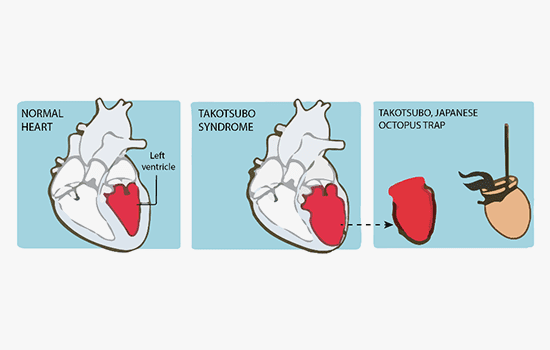Most heart attacks are due to coronary arteries being blocked by blood clots that form when plaques of cholesterol rupture. The lack of blood flow through the blocked arteries results in heart muscle dying – hence the name “heart attack.”
But over the past few years, physicians have come to recognize and better understand another form of heart attack. This unusual type of heart attack does not involve rupturing plaques or blocked blood vessels. It is called takotsubo cardiomyopathy, or stress cardiomyopathy. It is named “takotsubo” because during this disorder, the heart takes on a distinctive shape that resembles a Japanese pot used to trap an octopus. The disorder was commonly believed to be caused by sudden emotional stress, such as the death of a child, and to be far less harmful than a typical heart attack. For that reason, some had also labeled this condition “broken-heart syndrome.”

Compared with people who had experienced a “typical” heart attack, patients with takotsubo cardiomyopathy were almost twice as likely to have a neurological or psychiatric disorder. And in contrast to the commonly held belief among doctors that takotsubo cardiomyopathy is less serious than other forms of heart attack, the rates of death in the hospital between takotsubo cardiomyopathy and more “traditional” heart attacks were similar.
As awareness of this disease increases among physicians and patients, I suspect we will be recognizing even more cases of takotsubo cardiomyopathy in the future. The condition certainly does not appear to be as rare as was suspected, nor as harmless as had been believed.
Future research will be needed to determine the best care of patients with takotsubo cardiomyopathy and lower their risk for future problems. Right now, we often use the same medications to treat weakened heart muscle in takotsubo cardiomyopathy, as we do with other forms of heart attack, but there really are not many good studies yet regarding the optimal medication choices for people who have experienced takotsubo cardiomyopathy.
Dr. Mahesh Ghogare, a highly skilled interventional cardiologist, have vast experience in performing coronary angioplasty through the radial route. Having successfully conducted over 3,000 angiographies and more than 500 angioplasties, Dr. Ghogare specializes in advanced cardiac interventions and is adept at handling complex cases with precision. His expertise extends to permanent pacemaker implantation, carotid and renal angioplasties, as well as interventions for pediatric cardiac diseases. With his commitment to patient care and extensive experience in the field, Dr. Ghogare remains at the forefront of advanced cardiovascular treatment in India.